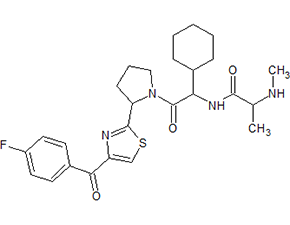LCL161CAS号: 1005342-46-0分子式: C26H33FN4O3S分子量: 500.63描述纯度储存/保存方法别名可溶性/溶解性靶点In vitro(体外研究)In vivo(体内研究)
| 产品描述 | |
| 描述 |
LCL161, a SMAC mimetic, potently binds to and inhibits multiple IAPs (i.e. XIAP, c-IAP). Phase 2.
|
| 纯度 |
99%
|
| 储存/保存方法 |
Store at -20℃ for one year(Powder);Store at 2-4℃ for two weeks;Store at -20℃ for six months after dissolution.
|
| 基本信息 | |
| 别名 |
LCL-161
|
| 可溶性/溶解性 |
DMSO : 100 mg/mL (199.75 mM; Need ultrasonic)
|
| 生物活性 | |
| 靶点 |
cIAP,XIAP
|
| In vitro(体外研究) |
LCL161 binds to inhibitors of apoptosis proteins (IAPs) with high affinity and initiates the destruction of cIAP1 and cIAP2, which further induces apoptosis via caspase activation. LCL161 modestly inhibits the growth of FLT3-ITD-expressing cells when administered alone, with an IC50 ranging from ~0.5 μM (Ba/F3-FLT3-ITD cells) to ~4 μM (MOLM13-luc+ cells). The potency of LCL161 against the D835Y mutant is observed to be considerably higher, with an IC50 of ~50 nM when tested against Ba/F3-D835Y cells. Treatment of MOLM13-luc+ cells with a combination of LCL161 and PKC412 leads to significantly more killing of cells than either agent alone, with Calcusyn combination indices suggestive of synergy.PKC412 and LCL161 induces apoptosis of MOLM13-luc+ cells. The combination of PKC412 and LCL161 leads to a higher induction of apoptosis than either agent alone. LCL161 is able to override stromal-mediated rescue of mutant FLT3-expressing cells through positive combination with PKC412. LCL161 inhibits the growth of Ba/F3.p210 cells with an IC50 of ~100 nM. The combination of LCL161 and the ABL inhibitor, imatinib, is observed to be synergistic against BCR-ABL-expressing cells. LCL161 also has demonstrated activity against drug-resistant cells expressing point mutations in the target proteins. LCL161 at 1000 nM is able to mostly or completely kill Ba/F3-derived cell lines conferring resistance to PKC412, which express FLT3-ITD harboring point mutations in the ATP-binding pocket of FLT3. LCL161 also shows activity at concentrations ranging from 100 to 1000 nM against Ba/F3 cells expressing various imatinib- and nilotinib-resistant BCR-ABL point mutations. LCL161 is evaluated against the 23 cell lines in the Pediatric Preclinical Testing Program (PPTP) in vitro panel using 96 hr. LCL161 achieves 50% growth inhibition against only 3 of the 23 tested PPTP cell lines under concentration of 10 μM. The three cell lines includes two T-cell ALL cell lines (COG-LL-317 and CCRF-CEM) and an anaplastic large cell lymphoma cell line (Karpas-299), with CCRF-CEM and Karpas-299 showing the lowest relative IC50 values (0.25 and 1.6 μM, respectively). LCL161shows immunomodulatory properties on human immune subsets. T lymphocytes treated with LCL161 demonstrates significantly enhanced cytokine secretion upon activation, with little effect on CD4 and CD8 T-cell survival or proliferation. LCL161 treatment of peripheral blood mononuclear cells significantly enhances priming of naïve T cells with synthetic peptides in vitro. Myeloid dendritic cells undergoes phenotypic maturation upon LCL161 and demonstrates a reduced capacity to cross-present a tumor antigen-based vaccine. These effects are potentially mediated through an observed activation of the canonical and non-canonical NF-κB pathways, following LCL161 with a resulting upregulation of anti-apoptotic molecules.
|
| In vivo(体内研究) |
LCL161 significantly enhances the ability of PKC412 to inhibit the growth of Ba/F3-FLT3-ITD-luc+ cells in vivo. LCL161 is also shown to positively combine with the standard chemotherapeutic agents, Ara-c and doxorubicin, against FLT3-ITD-expressing cells and against D835Y-expressing cells. There is an additive effect achieved by combining both Nilotinib and LCL161 in suppressing leukemia growth. LCL161 (100 mg/kg) enhances in vivo effects of high-moderate doses of nilotinib (100 mg/kg) on leukemia burden in mice. CL161 is tested against the Pediatric Preclinical Testing Program (PPTP) in vivo panels (30 or 75 mg/kg or 100 mg/kg ) administered orally twice in a week. LCL161 induces significant differences in EFS distribution in approximately one-third of solid tumor xenografts (osteosarcoma and glioblastoma), but not in ALL xenografts. No objective tumor responses are observed. In vivo LCL161 demonstrates limited single agent activity against the pediatric preclinical models studied.
|
分子结构图

